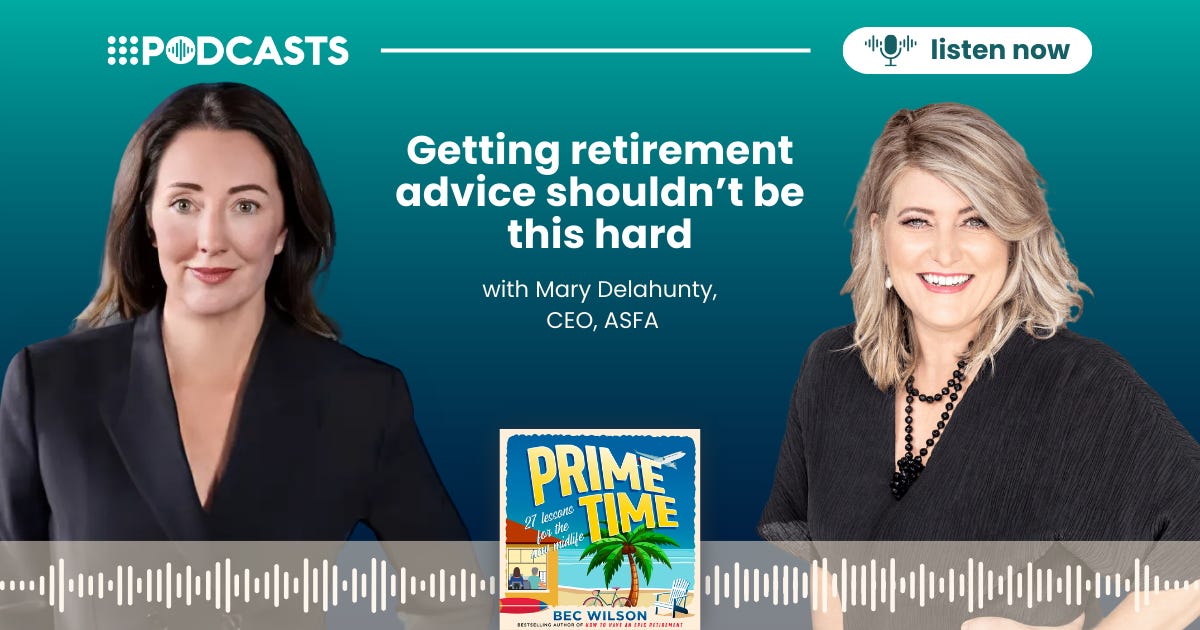The spending myth that might not hold up in your retirement
And in today's newspapers, 'The advice gap: Why are we abandoning middle-class retirees?'
In this week’s edition:
Feature: The spending myth that might not hold up in your retirement
Newspapers: The advice gap: Why are we abandoning middle-class retirees?
Podcast: Getting retirement advice shouldn’t be this hard
From Bec’s Desk: The Chant West Pension Fund of the Year is…
The spending myth that might not hold up in your retirement
(Spoiler: spending doesn’t always drop as you age)
There’s this persistent little myth that floats around whenever people start planning for retirement:
“You’ll spend less as you get older.”
Sounds logical, doesn’t it? No more commuting to the office. No more work wardrobe. No more takeaway coffees at morning tea, afternoon tea, and Friday lunch. If the mortgage is gone and the kids have moved out (or at least slowed down their wallet-draining efforts), surely your costs will go down too?
Except… that’s not how it works for most people I meet. And interestingly, retirement researchers don’t all agree on what’s coming for future generations either.
Retirement spending: past trends vs what’s ahead
When we look back at earlier generations, we see a clear trend:
Each new generation of retirees starts retirement spending more than the last—and they finish retirement spending more too.
But here’s where it gets tricky. The curve of spending across life appears as a gentle downward slope. Why? Because the data is often comparing different cohorts at different stages: one generation in its 80s and another just entering retirement. So yes, the chart drops. But that doesn’t mean your own personal spending will.
In fact, for most people, the shape of spending over retirement is relatively flat. What changes is what you’re spending on.
The real rhythm of retirement spending
In the early years, it’s all go-go-go.
Travel, activities, entertainment, leisure—all those things you finally have time for.
Then, in the middle years, spending on your home, your health, and your family might creep up.
And in later life, aged care, in-home services, and health support can start taking bigger bites out of the budget.
Meanwhile, essentials like housing, insurance, and utilities often stay steady—not really helping that “spending goes down” narrative.
The truth? You might spend more
Especially in the first 5 to 10 years after leaving full-time work. Why?
Because you’ve finally got time - and a long list of things you’ve been waiting to do.
This is your Epic Retirement. You’re healthy, energetic, and ready to say yes to the good stuff:
Big holidays
Club memberships
Home upgrades
Hobbies that mysteriously require lots of gear
Trips to see the grandkids (who are somehow always interstate or overseas)
I’ve looked at hundreds of retirement budgets. And honestly? Most people spend more in the early years - not less.
And yes, spending can drop later… kind of
Spending might ease off in your 80s, depending on your health, lifestyle, and support needs. But even then—it’s not guaranteed. If you need extra help at home, care services, or residential aged care, those costs can ramp right back up.
That classic image of spending gently tapering off as you age? Too simplistic. Real life’s not that neat.
So what does this mean for your plan?
It means you need to:
Budget properly for your epic retirement years
Build in flexibility, because life doesn’t follow a straight line
Give yourself permission to enjoy the early years, guilt-free
Retirement isn’t a financial dead zone. It’s not about shrinking into a smaller life.
It’s about choosing how you want to spend your time—and yes, your money.
Don’t short-change your Epic Retirement. You’ve earned it.
The How to Have an Epic Retirement Flagship Course is back for August kickoff! And the Earlybird 25% off won’t last!
This 6-week program has helped thousands of Aussies get retirement-ready - with smart strategies for money, time, health, happiness and purpose, travel and your home as you age.
🎟️ The 25% off early bird spots are now open and they’re filling up quickly. So get in and lock down your place at this price.
👉 Check it out here and download the new brochure for Spring 2025
Let’s make your retirement epic.
The weeks are flying by at the moment.
This week we wrapped up our How to Have an Epic Retirement Flagship Course for Winter. We finished on a high with the wonderful Fiona Dalton, travel guru and fountain of practical inspiration, joining us for a live Q&A on the secrets of the travel sector. It ran 15 minutes over time because people were having such a great time. Always a good sign.
A few radio shows about the $3M tax too — apparently a lot of people have feelings on it that they didn’t express in the election.
I then popped down to Sydney for the Chant West Super Fund of the Year Awards—and what a brilliant night it was. A proper celebration of all the hard work happening across the super industry.
A huge congratulations to the team at Aware Super, who took out Best Pension (Retirement Phase) Fund, and to Unisuper, who won Best Super (Accumulation Phase) Fund. These awards are hotly contested, and both funds should be super proud (pun absolutely intended).
The rest of the week? Books, courses, articles... it’s a full plate and I wouldn’t have it any other way.
I sat down with Mary Delahunty to talk about the real issue holding up financial advice reform - and why it’s slowing progress on making advice more accessible and affordable. See the podcast below.
If you’ve been following along, you’ll know my 12-year-old pup has had a tough time with paralysis for about 3-4 months - but this week, he stood up on his own. We’re now counting down to the next big milestone: his first steps.
And for me? The week ahead is all about recording the audiobook for Prime Time. Twelve long days in the studio start now. Wish me luck (and a strong voice)! The men in my household all have man-flu right now so I’m headed for quarantine.
Our 25% off Earlybird Deal is booking up so incredibly well for the Spring Edition of the How to Have an Epic Retirement Flagship Course, which kicks off on 28 August 👉🏻 More info here 👉🏻
Got thoughts this week — send an email to bec@epciretirement.net. I read every one.
Cheers, Bec Wilson
Author, podcast host, columnist, retirement educator, and guest speaker
The advice gap: Why are we abandoning middle-class retirees?
Extract of article published in print in The Age, The Sydney Morning Herald, Brisbane Times, WA Today on Sunday 25th May 2025.
There’s a big problem with financial advice in Australia, and it’s been dragging on for years: most people heading toward retirement can’t get the help they need to understand their money and structure it for their retirement.
Super funds want to offer advice. Financial advisers want to protect their role as the go-to experts and don’t want funds in their category. And the government? Well, they’ve been reviewing it all for years and doing very little.
While the government stalls and industry bodies argue over who should do what, the people who actually need advice are still missing out. The system, as it stands, is failing those who need help the most. And it’s time we stomped our feet.
If you’re an everyday Australian with up to $500,000 in super and a family home, chances are you’re not getting personal financial advice at all. You probably can’t justify spending $3000 to $5000 or more, on a full financial plan.
But you’re precisely the kind of person who needs one-off personal guidance on how to combine your super with the age pension, whether downsizing might be worth considering, how to make your money last, and when you can afford to pull the pin on work.
These are the real-life questions people are asking. But answers are difficult to come by because the current system doesn’t serve people like you.
The truth is, advice in Australia isn’t designed for the majority any more. There’s less than 16,000 financial advisers left, and insiders say perhaps only half are actively seeing clients.
The rest are behind the scenes writing plans and handling compliance. Most advisers focus on wealthier households because that’s what makes the business model viable.
Super funds are well-positioned
Your super fund probably knows you’re getting close to retirement. They’ve got tools, calculators, and people on staff who want to help (and they’re ready to charge a fee for that help too, albeit a smaller one than most comprehensive advisers).
But here’s the catch: they’re legally restricted from giving you personal financial advice unless they jump through costly and complex hoops, like acquiring or establishing a licensed advice business and running it separately on a fee-for-service basis, just like a traditional financial planning firm.
(READ ON… in The Age, The Sydney Morning Herald. )
We’ve built a colossal $4.2 trillion super system, but we’ve failed at the one thing people need most: guidance and advice for everyday people.
Most Australians hit their 50s or 60s with savings in super, fear in their gut, and no idea what to do next. And when they go looking for advice, they hit a brick wall. Financial advisers are expensive, often full-service only, and in short supply. Super funds? Most are legally restricted from giving personalised help. The result? Confused, stressed-out pre-retirees stuck in limbo.
This is Australia’s retirement blind spot—and we’re long overdue to fix it. Getting advice on your retirement shouldn’t be this hard!
In this episode, I sit down with Mary Delahunty, CEO of the Association of Superannuation Funds of Australia (ASFA), to unpack the long-awaited reforms that aim to close the advice gap. Reforms that seem to be moving very slowly!.
We talk about the politics, the pain points, and the promise of a new class of advice that could finally meet people where they are—with the right help, at the right price, when they actually need it. If you’ve ever asked, “What should I do with my super?” or “How do I navigate retirement” and been met with silence, rules, or fees—you’ll want to hear this.
LISTEN TO THIS EPISODE OF THE PODCAST HERE:














Popping my head in here to say how much I enjoy your work, Bec! This is excellent advice. As you point out, the cost of care in our 80s and 90s is the wild card here. And one thing’s for sure: it’s gonna get wilder.
We can’t expect to be paying what our parents are paying. Governments are already getting real about that.
I’m investing in my health in a big way right now in my 60s.
It’s clear: health is going to be as important as wealth.
Thanks for raising the myth, as I hadn't given it proper consideration. I think I may actually spend more initially, taking longer or better holidays whilst I am physically able to do so.